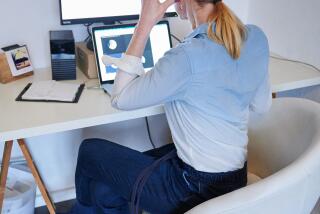Job Stress May Offset Benefits of Activity
- Share via
WASHINGTON — Physical activity on the job should be good for a person’s blood vessels--unless the job has a lot of stress, which can cancel the activity’s value, a study indicates.
“If you are performing the activity in a psychologically taxing context, you are not going to see the benefit,” said researcher Cheryl Nordstrom. “The stress seems to negate it.”
Another expert, however, considers that conclusion provocative but not yet proved.
Nordstrom and her colleagues at USC’s Keck School of Medicine looked at 447 utility workers just after deregulation increased competition among utilities. Results were presented March 2 at a meeting of the American Heart Assn. in San Antonio.
The workers, ages 40 to 60, held jobs such as managers, meter readers or administrative assistants. Nordstrom would not identify the company or the type of utility, saying the researchers had promised confidentiality.
None of the workers was diagnosed at the start of the study as having atherosclerosis, thickening of the arteries. Over three years, the scientists used ultrasound imaging to measure any thickening of the carotid arteries, which carry blood to the brain. Thickening of these arteries in the neck can signal a buildup of artery-clogging plaque deposits in other large vessels, including ones in the heart.
Stress can raise clotting factors in the blood and may prompt the release of fat into the bloodstream, which can lead to clogging of the arteries. Physical activity, on the other hand, has been shown to reduce levels of these fatty acids.
Researchers found, to their surprise, that people who got the most physical activity on the job had the greatest thickening of the arteries, Nordstrom said.
Conventional wisdom is that being active improves cardiovascular health. And a separate part of the study supported the conventional wisdom. This section found that the people who were most physically active off the job--working up a sweat by exercising an average of five times a week--had less progression toward atherosclerosis, Nordstrom said.
What could account for the difference between activity on the job and activity off it? The scientists went back to a stress questionnaire they had done earlier on the same people. The questionnaire asked people about such things as whether there had been a marked increase in their workload, and whether they had trouble sleeping because their jobs were still on their minds.
The researchers found that the people who worked the hardest, and who worked the most hours, reported the greatest job stress, Nordstrom said. And when the researchers did statistical analysis, it turned out that the job stress was most closely associated with the increase in carotid thickening, she said.
“When I look at them together, the effect of the [physical] activity drops out,” Nordstrom said. “It becomes slightly protective, which I would expect. But the stress indicators were highly related.”
“These findings suggest that protective effects of physical activity may be blocked or counteracted when activity is performed in a psychologically stressful context,” the researchers reported in the abstract they presented at the conference.
Another expert, however, has his doubts. The USC conclusion that job stress can lead to atherosclerosis is supported by some previous studies but not by others, said Dr. Richard Stein, chief of cardiology at Brooklyn Hospital Center in New York City and a spokesman for the heart association. And the USC research also leaves a lot of questions unanswered, he said.
For instance, the study did not ask the participants directly if they felt anxious. “The guys might not have perceived stress,” Stein said. “We are making an assumption.”
The claim that job stress offsets the value of exercise is “intriguing, but doesn’t justify the conclusion,” Stein said. However, the report is worth following up, and “if this holds up to that type of criticism, it is a very interesting observation,” he said.




